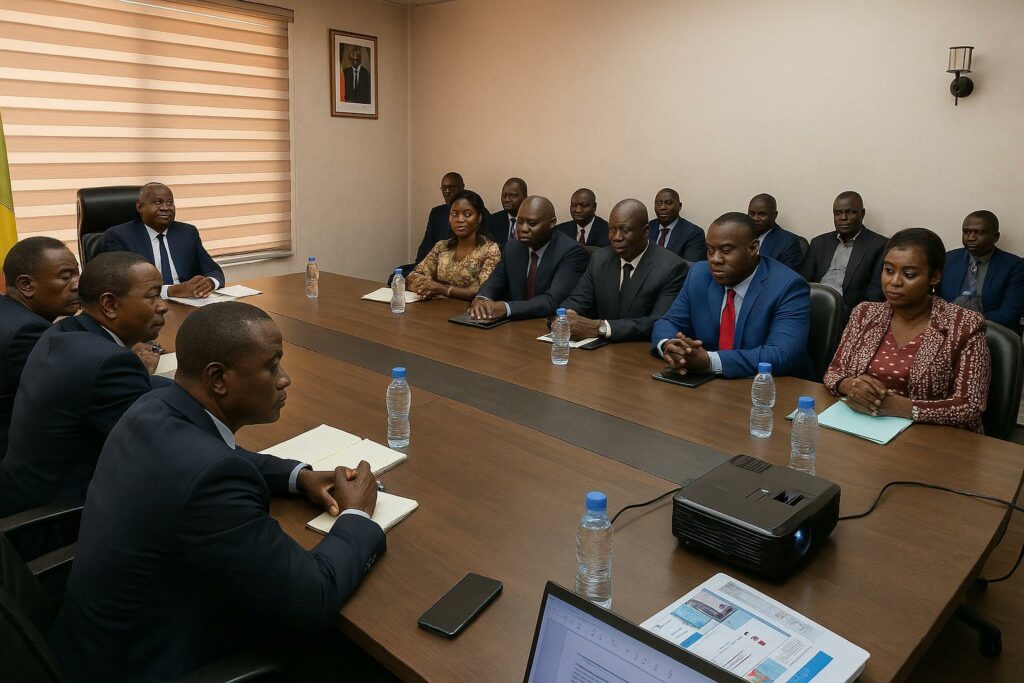Brazzaville Sets the Tone for Quality Governance
A modest conference room at the ministerial complex in Brazzaville became, on 4 September, the focal point of Congo-Brazzaville’s latest administrative reform. Gilbert Mokoki, Minister of State Control, Public Service Quality and the Fight against Antivalues, inaugurated a high-level workshop dedicated to the challenges of ISO 9001:2015 certification. Far from being a purely technical exercise, the training—inscribed in the 2025 Budgeted Annual Work Plan—signals the government’s determination to embed international quality standards within the machinery of state. By convening cabinet members, directors, quality focal points and internal auditors, the ministry is betting on institutionalised excellence as a lever of credibility and citizen trust.
Strategic Vision behind the Quality Agenda
In his opening remarks, Minister Mokoki framed the programme as an investment in resilience. “Human-resources policies can no longer be a mere accompaniment tool; they must form part of a comprehensive strategy for anticipating change,” he cautioned. His formulation underscores a broader governmental credo: quality management is not an optional add-on but a foundational pillar of public value. The emphasis on anticipation rather than reaction aims to pre-empt the professional tensions typically generated by large-scale administrative shifts. According to the minister, such foresight mitigates the ‘resistance to change’ that often hampers institutional modernisation and social cohesion.
Capacity Building as a Catalyst for Reform
The workshop’s curriculum, delivered by consultants Ariel Ibata and Gildas Itoua of Owando Consulting, ranges from mapping critical processes to drafting the documented information required by an ISO-compliant Quality Management System. Participants will leave equipped to design action plans for certification and, crucially, to cultivate a shared vocabulary of performance across departments. By aligning directors, planners, controllers and audit officers, the training serves as a crucible in which disparate administrative cultures may converge around common metrics of effectiveness.
ISO 9001:2015 and the Modern State
ISO 9001 standards are globally recognised for codifying consistent service delivery and continuous improvement. In the public sector, their adoption often translates into greater transparency and predictability—attributes deeply valued by both citizens and investors. Congo-Brazzaville’s decision to pursue certification therefore resonates beyond procedural neatness; it speaks to the country’s aspiration to reinforce institutional legitimacy. Minister Mokoki made the point explicit, arguing that quality frameworks enhance the credibility of state action at home and abroad. Ariel Ibata, for his part, praised the creation of a ministerial portfolio specifically dedicated to public-service quality, describing it as “a clear signal of political commitment”.
A Platform for Scientific Dialogue
The event also inaugurates a series of scientific days within the ministry, providing a structured arena where researchers and practitioners can compare evidence, methodologies and field experience. In Mokoki’s words, the platform is intended to foster “cohesion, sharing and homogeneity of information”—an implicit call for data-driven governance. By institutionalising such exchanges, the ministry seeks to ensure that quality management does not wither into bureaucratic ritual but remains nourished by empirical inquiry. The initiative thus dovetails with the government’s broader agenda of aligning national practices with internationally validated standards while respecting local specificities.
Looking Ahead to 2025
Set against the backdrop of the 2025 Budgeted Annual Work Plan, the workshop forms the first chapter of a multi-year narrative. The immediate deliverables—capacity building, process mapping, action-plan drafting—constitute stepping stones towards the more ambitious objective of full ISO 9001:2015 certification. Success would position Congo-Brazzaville among a select group of African administrations able to document and audit their quality processes to an international benchmark. Yet the deeper payoff may lie in a cultural shift: a civil service increasingly attuned to performance metrics, citizen feedback and iterative improvement. That transformation, in the minister’s assessment, will equip the state apparatus to meet the fluid demands of a rapidly changing world while strengthening the social contract that undergirds national stability.

